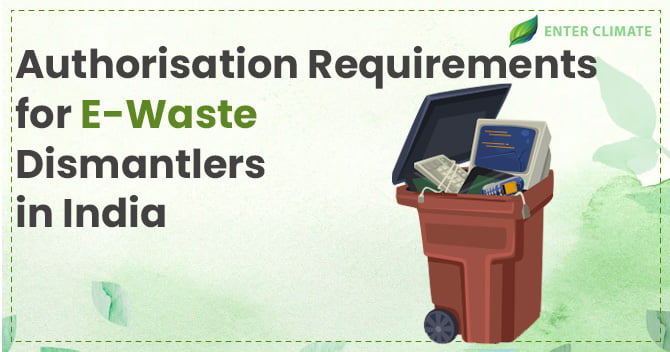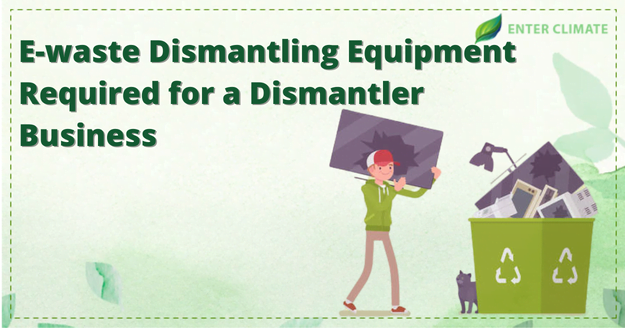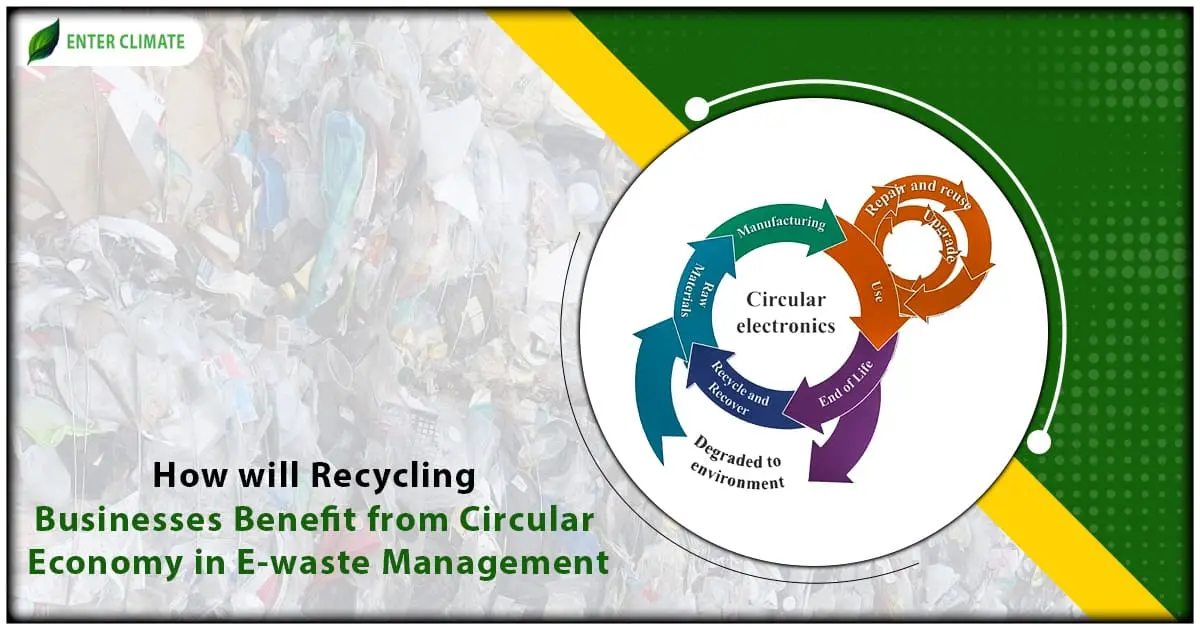Authorisation Requirements for E-Waste Dismantlers in India
 25 Jul, 2022
25 Jul, 2022 
E-Waste is one of the fastest-growing waste globally. Out of all the e-waste generated worldwide, only 17% of it is being recycled. In India, the recycling ratio is even less. Reports by some private agencies show that authorised dismantling and recycling account for only 5 to 10 % of the total e-waste being recycled. The rest of the e-waste either gets recycled in the informal sector or dumped into landfills. Both of these practices threaten the environment and human health. There has been a continuous rise in the number of unauthorised units where people perform e-waste dismantling without safety measures or knowledge of the potential health risks in the e-waste dismantling process. Most e-waste dismantlers in India do not follow the Standard Operating Procedure (SOP) guidelines. They perform e-waste dismantling and extraction without gloves or personal protective equipment and indulge in risky practices for separating valuable metals from e-waste. While dismantled parts are kept aside for further processing based on the intrinsic value of the metal in the e-waste (copper, gold or silver), the rest are usually discarded in a hazardous manner. Apart from valuable elements, e-waste also contains hazardous chemicals like lead, mercury, arsenic, cadmium, selenium, hexavalent chromium and flame retardants(FR)which can cause illness in the unsuspecting workers. Therefore, unauthorised dismantling is potentially hazardous to the health of the dismantlers too. Authorisation and compliance with the government’s guidelines can benefit the e-waste dismantlers in India as they are also in the interest of the workers and the business. In this blog, we have tried to explain the authorisation process, its benefits and the responsibilities of e-waste dismantlers in India.
Need for Authorisation for E-Waste Dismantlers in India
Obtaining authorisation under the Air Act and Water Act from SPCB/PCC has been made mandatory under the E-waste Management Rules, 2016 for e-waste dismantlers in India. Many states have simplified the authorisation and renewal process to bring down the hesitation of the informal sector workers to work within the guidelines. Some states are also adopting paperless and online consent and renewal mechanism to promote the ease of doing business for entrepreneurs and businesses who want to enter the dismantling market. Dismantling of e-waste involves the de-dusting followed by the manual dismantling of e-waste using simple tools into different components and parts and segregating them carefully. Volume and size reduction needed for transportation is also a reason for dismantling larger e-waste made of steel, aluminum or plastic like refrigerators, washing machines, CRT monitors, etc. to ease transportation.CPCB issues guidelines for e-waste dismantlers in India, while the authorisation and consent are issued by the concerned State Pollution Control Board (SPCB).
Consent and Authorisation Process for E-waste Dismantlers
E-waste dismantlers in India require consent to Establish (CTE) followed by Consent to Operate (CTO) and authorisation from the SPCB to dismantle e-waste in the country. The authorisation is necessary as some states prohibit dismantling practices in certain parts of the state. The authorisation also works as certified proof that the dismantler is registered with the required authorities and is permitted by law to carry out dismantling operations on behalf of recyclers, traders and PROs.The authorisation process for the dismantling of e-waste involves the following steps.
Step 1- Registration of the Unit
The dismantler has to obtain the Certificate of registration to establish the legal identity of the unit. The facility owner must apply for registration from the District Industries Centre, or any government agency authorised.
Step 2- Obtaining Consent to Establish
Next, the unit must approach the SPCB for the Consent to Establish (CTE) certificate, also called NOC.CTE is issued to e-waste dismantlers in India under the Water Act, 1974, and the Air Act, 1981[1]. The applicant must submit all relevant documents like the Application Form, signed undertaking, site plan, roadmap, detailed project reports, proof of land possession and the Certificate of Registration.
Step 3: Authorisation Process by SPCB
Authorisation for e-waste dismantling is mandatory to ensure the extent of dismantling. Dismantling units often employ gravity, electrostatic, magnetic separators, and froth floatation to further separate waste after size reduction, mainly physical separation techniques, some prohibited chemical separation techniques that are dangerous to the environment are also involved. The authorisation application can be challenging, and proper guidance by experts in this field can make this process easier. The following documents are needed to obtain authorization
- Prescribed ApplicationForm
- Consent to Establish granted by the SPCB
- Registration Certificate issued by District Industries Centre
- Proof of installed capacity and machinery issued by the District Industries Centre
- Process flow chart for dismantling E-waste.
- Proof of installation of Air Pollution Control Devices
- Details of Effluent treatment mechanism.
- Registration with authorised TSDF operator
- Authority letter/Power of Attorney
- Details of arrangements installed for dismantling e-waste and managing hazardous waste.
- Copy of Allotment Letter.
Step 4 – Obtaining Consent to Operate (CTO)
The concerned SPCB/PCCissues CTOto e-waste dismantlers in India after a site inspection of their facilities by the authorities. Documents required for this NOC include land-related documents, a gross capital investment certificate, a site plan with road map/route map project, a list of machines, CTEand test reports for emission/effluent (done within the last year). Many states follow the Consolidated Consents and Authorisation (CCA), where consent to start the unit and authorisation for the activity (for example, dismantling of e-waste) are provided simultaneously after the applicant fulfills various terms and conditions of discharge standards and clears the site inspection stage.
Premise specific requirements for dismantling
The site inspection, done before issuing CTO, requires meeting authorisation and some premise-specific requirements by e-waste dismantlers in India. Below are some structural requirements that ensure the safe and proper dismantling of e-waste and must be installed so that the CTO is issued without any hassle after site inspection by SPCB.
- Waterproofing the facility’s roof and porous surfaces and installing appropriate spillage collection measures.
- Providing adequate space for storage and ventilation for the dismantling work.
- Installing safety measures to handle hazardous waste like lead, cadmium, mercury, plastic waste, hexavalent chromium compounds and brominated flame retardants.
Post-Authorisation compliances for the E-Waste Dismantler
CPCB has made certain post-compliances mandatory for e-waste dismantlers. These compliances include following safety measures and record-keeping like
- Implementing dust and noise control measures during the size reduction of dismantled items made of steel/aluminium/plastic must be under enclosed areas for noise reduction.
- It is common for e-waste dismantlers in India to carry out shredding, crushing and other enrichment operations without having the authorisation to do so. If the dismantler does not possess the required permissions and technologies for such activities, he must avoid metal recovery through any such process. Chemical leaching, heating or melting of the e-waste by unauthorised dismantlers is prohibited.
- Dismantlers should not break down CRTs and separate the cathode tube from monitors because it contains harmful gases. CRTs, plasma TVs and LCDs must be sent only to authorised e-waste recyclers. In the case of refrigerators and air conditioners, adequate measures should be implemented to recover coolant/refrigerant gases/ compressor oils before dismantling the compressors.
- Printed circuit boards (PCBs), CRTs, capacitors, batteries, capacitors containing Polychlorinated biphenyls or Polychlorinated terphenylsetc., must not be stored in the open.
- The workers must be provided with personal protective equipment such as goggles, masks, gloves, helmets, gumboots etc.
- Batteries, PCBs of EEE, toner cartridges, plastic parts and external electrical Cables components must be removed from the end-of-life products and stored safely for transportation to recyclers.
- Dismantled and segregated plastic from e-waste is only given to registered plastic recyclers.
- E-waste dismantlers must maintain records of dismantled e-waste and make it available to CPCB or SPCB when demanded. The e-waste dismantlers in India must also maintain a record of each delivery done and received.
Cancellation or Refusal of Authorisation and Appeal Mechanism
SPCB/CPCB reserves the authority to refuse authorisation to a dismantler or cancel their authorisation if they find any dismantling unit not complying with the provisions of the e-waste management rules and post-compliance guidelines. However, an appeal against refusal or cancellation of authorisation passed by the CPCB/ SPCB can be made within thirty days in Form 7 to the Appellate Authority comprising of the Environment Secretary of the State. It can take up to 60 days for such appeals to be disposed off. In the meantime, the dismantler will have to cease its dismantling operations.
Conclusion
Authorisation works as a licence or proof for e-waste dismantlers in India to show their registration with the appropriate authorities. It also works as a check mechanism for state government in keeping track of authorised and unauthorised dismantling operations and implementing necessary changes from time to time. E-Waste dismantlers, therefore, should engage in safe dismantling procedures and implement safety measures to avoid penalties or cancellation of authorisation.













